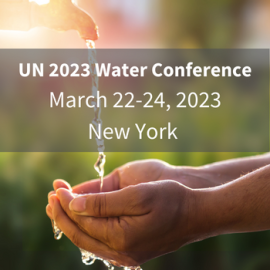
Date: March 23, 2023
Time: 3:30-5:00 pm ET (12:30-2:00 pm PT)
Location: Environmental Defense Fund, 257 Park Ave S, New York, NY 10010
Hosts: Stanford University, Environmental Defense Fund, Alliance for Global Water Adaptation
Experts from Stanford's Water in the West program spoke at this side event during the UN 2023 Water Conference.
This panel provided examples of how climate change is water change -- and how water is also the key to both climate mitigation and adaptation efforts, particularly in the implementation of nature-based solutions. Panelists described on-the-ground projects and studies of their efficacy that illustrate how imperative it is to address water and climate together, and how including nature-based solutions, particularly when coupled with proactive groundwater management, can provide multiple-benefits to people and nature. The panel supported conference themes 2 and 3 and provided tangible examples of working with nature that can be included in the post-conference Water Action Agenda.
Angela Churie Kallhauge, Executive Vice President for Impact at Environmental Defense Fund (EDF) provided a welcome and opening remarks. Her work is focused on using inclusive processes and economic approaches to achieve ambitious climate solutions that deliver equitable benefits to people around the world.
The panel featured a stage-setting presentation by Erica Gies, the author of Water Always Wins: Thriving in an age of drought and deluge. This recently published book details the Slow Water movement and covers examples from around the world where communities have undertaken creative restoration work that restores natural water systems, via geology, microbes, beavers, ancient and current human practices, with multiple benefits for people, species, and climate mitigation and adaptation.
Other panelists included:
- Felicia Marcus (moderator), Landreth Visiting Fellow at Stanford University’s Water in the West Program, and Founding Member of the Water Policy Group, who recently wrote a report on synergies between state climate policies and nature-based solutions that can yield multiple benefits especially for climate, water supply, and water quality in the Colorado River Basin.
- Scott Fendorf, Stanford University Professor and Senior Fellow at the Woods Institute for the Environment, the author of a recent study that found that beaver restoration provides a powerful buffer against climate change impacts with important benefits for river water quality.
- Vanessa Puig-Williams, Director for EDF’s Climate Resilient Water Systems program in Texas, will discuss the importance of aquifers as critical natural infrastructure and how nature-based solutions can support proactive planning and management of groundwater.
- Ingrid Timboe, Policy Director for the Alliance for Global Water Adaptation, who writes about and advocates for nature-based solutions for water and climate benefits around the world.
Questions? Contact Lucy Caine at LCaine@edf.org




